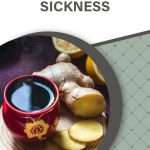Ahh, morning sickness, the bane of many expectant mothers’ existences. While we envision pregnancy as a time of baby bumps, showers, and cute maternity clothes, we often forget that continual vomiting can also be par for the course.
Even more shocking is how quickly the inability to keep food down seems to start.
I swear it seemed like the moment a positive result popped up on my pregnancy test, I felt a sudden urge to revisit my breakfast.
While morning sickness and pregnancy-related nausea are a pain in the butt, it’s essential to remember they’re a standard part of the process for many pregnant people.
However, that doesn’t mean there’s nothing you can do to correct the issue.
From ginger tea to medications, we live in a time with more options than ever before for treating morning sickness during pregnancy.
Want to know some of our favorites for overcoming pregnancy nausea? Take a look at the great tips and tricks we’ve discovered below.

This site contains affiliate links, meaning that we earn a small commission for purchases made through our site. We only recommend products we personally use, love, or have thoroughly vetted.
- What is Morning Sickness, and Why Do We Get It?
- What is Hyperemesis Gravidarum?
- The Best Morning Sickness Treatments for Expectant Mothers
- Over-the-Counter Remedies
- Is Morning Sickness Bad for Your Baby?
- Is Not Having Nausea During Pregnancy a Bad Thing?
- Remember that Pregnancy Nausea is Only a Temporary Experience
What is Morning Sickness, and Why Do We Get It?
Morning sickness is one of the most common early symptoms of pregnancy. In fact, approximately 70% of expectant mothers will experience it. Some women even notice it during the first two to three weeks after conception.
Morning sickness is another way of describing the upset stomach issues we face during early pregnancy. Many will experience nausea and often vomiting, as well.
Despite the commonality of morning sickness, however, experts aren’t entirely sure why we have to deal with it.
The best guess is that it stems from pregnancy hormone levels starting to rise. These include human chorionic gonadotropin (hCG) and estrogen. Other possibilities include low blood sugar, stress, or food sensitivities.
Some medical experts believe individuals with a history of motion sickness are also more susceptible.
One surprising tidbit about morning sickness is that it doesn’t always occur first thing in the day. Some people will continue having GI trouble into the afternoon and evening, though mornings are most usual.
Does Everyone Have Nausea During the First Trimester?
While it might seem only fair for all women to share this pregnancy nausea experience, some of us (around 30% of pregnant folks) never have morning sickness.
It can also change from pregnancy to pregnancy.
I was nauseous for much of the first trimester with my first daughter. In fact, I have vivid memories of a ruined celebratory dinner because of it. I was terrified for it to start again when I was expecting my second, but it never did.
Sure, I had moments of a queasy stomach, but overall, I felt great during the first trimester.
Just because you experienced stomach troubles during a previous pregnancy, there’s no rule stating it’s guaranteed to happen again.
There’s not always a lot of rhyme or rhythm to morning sickness, but it’s bound to end at some point…right?
How Long Does Morning Sickness Usually Last?
Most of us will kick our morning sickness to the curb around 14 weeks as a general rule of thumb. It will sometimes last into the second trimester and rarely continue throughout a woman’s entire pregnancy.
What is Hyperemesis Gravidarum?
It’s important to realize that nausea and vomiting during early pregnancy are typical. There are times, however, when morning sickness can become problematic.
One to three pregnant women out of every 100 will experience a condition known as hyperemesis gravidarum (HG.) This is a severe form of morning sickness that can become problematic for mom and baby if not handled correctly.
Signs You Have Hyperemesis Instead of Normal Morning Sickness
Understanding the difference between normal morning sickness and HG is crucial.
If you notice any of the following hyperemesis symptoms during early pregnancy, make an appointment with your doctor or midwife as soon as possible:
- Severe Nausea that Doesn’t Let Up
- Vomiting More than 3 or 4 Times a Day
- Signs of Dehydration, i.e., Fatigue, Dizziness, Dry Lips, etc.
- Weight Loss (Especially if it’s More than 5% of Your Total Body Weight)
- Headaches
- Low Blood Pressure
While there are many homeopathic treatment options you can try to curb the effects of HG, your healthcare provider may want you to receive intravenous therapies, such as steroids or electrolytes.
Your medical team might also prescribe medication to help treat your HG. Some typical choices are:
- Prochlorperazine (Compro)
- Metoclopramide (Reglan)
- Promethazine (Phenergan)
- Ondansetron (Zofran)

The Best Morning Sickness Treatments for Expectant Mothers
There’s no denying morning sickness during pregnancy is frustrating, inconvenient, and a total buzzkill. Luckily, though, doctors and creative moms everywhere have come up with some great treatment options to help curb nausea and vomiting – at least a little bit.
Over-the-Counter Remedies
We live in a time where we’re always looking for great, natural products to alleviate various conditions and symptoms.
Morning sickness treatments are no exception.
There are so many great over-the-counter remedies for pregnancy nausea and vomiting that soon-to-be-moms depend on. Our favorites include:
1. Preggie Pop Drops
Preggie Pop Drops are a maternity essential! But don’t just take our word for it – be sure to check out their 14,000+ reviews on Amazon!
This hard candy-style nausea treatment contains amazing essential oils and botanical supplements to help get rid of morning sickness. They’re also kosher, lactose-free, gluten-free, and 100% natural.
Plus, they come in great sour flavors, which is helpful because sour foods tend to help with nausea, as well.
2. Pink Stork Morning Sickness Sweets
Pink Stork Morning Sickness Sweets are jam-packed with ingredients to reduce nausea, but they also contain a range of healthy vitamins for pregnant women.
These include vitamin b6, which works against nausea.
3. Dramamine Multi-Purpose
Dramamine is a long-time staple for motion sickness and nausea solutions. It’s no surprise that many of us have relied on their products to get us through early pregnancy morning sickness.
Their multi-purpose nausea formula is a favorite product of ours!
Ginger
To help treat nausea and vomiting, we’ve relied on ginger for generations. Products like ginger candies and chews are a trusted option for women who want to treat their morning sickness naturally.
Throughout the first trimester of my first pregnancy, I carried around large crystallized ginger bags to alleviate my nausea.
If you don’t enjoy eating ginger on its own, drinking ginger ale is another good option.
Acupuncture
Studies prove acupuncture to be an effective option for remedying pregnancy nausea. Trial research conducted in 2002 showed that groups of pregnant folks receiving acupuncture were less likely to experience morning sickness than those who weren’t.
Many certified acupuncturists suggest receiving treatments for morning sickness once or twice a week.
Acupressure Bracelets
Acupressure wristbands or bracelets, such as Sea-Bands, help treat nausea during early pregnancy.
These products work by stimulating a pressure point called P-6, or Neiguan. This point is noteworthy for reducing the side effects of morning sickness. A small, rounded plastic piece is located on the bracelets.
You should wear them so the plastic rests against the inside of your wrist.
Eat Small Snacks
When you were a little kid, and you’d have a tummy bug, your mom probably gave you tons of crackers (like saltines and soda crackers), dry toast, and other bland foods?
Well, morning sickness is the perfect time to bring that diet back.
Eating small snacks and meals, especially ones that are mild in flavor, can offset pregnancy nausea and vomiting.
Other good snack options include:
- Bananas
- Applesauce
- Rice
- Broth
- Gelatin
Magnesium-rich foods, including peanut butter, are also good additions to your morning sickness diet.
Chew Gum
Many moms also have good luck fighting nausea and vomiting with chewing gum.
Many companies even make specific types of gum targeted towards these symptoms, like Sea-Band Ginger Gum.
Drink Plenty of Water
Keeping up with fluids is a great way to deal with morning sickness. The American College of Obstetricians (ACOG) suggests drinking 8 – 12 cups of water every day during pregnancy.
Not only does ACOG state that this helps with digestion and amniotic fluid production, but dehydration is known to be a direct cause of nausea and vomiting.

Is Morning Sickness Bad for Your Baby?
While morning sickness is undoubtedly disruptive, there’s not usually cause for alarm. Many moms worry their babies are being affected because of pregnancy nausea, but typically this isn’t the case.
Just remember to stay on the lookout for morning sickness danger signs. If you’re rapidly losing weight, feeling dehydrated, or experiencing low blood pressure, it might be time for some diet and lifestyle changes until this period passes, and always contact your medical provider if you have any of these symptoms.
Is Not Having Nausea During Pregnancy a Bad Thing?
Since morning sickness seems to be the status quo for many pregnant women, it’s natural to worry if you’re not experiencing nausea and vomiting. Most of the time, though, this just means you’re lucky.
Keep in mind, though; if you’re concerned about your morning sickness, or lack thereof, don’t hesitate to make an appointment with your healthcare provider.
Remember that Pregnancy Nausea is Only a Temporary Experience
It can seem like nausea and vomiting during pregnancy will never end when you’re in the thick of it.
In reality, though, it always does.
So, every time you’re on the search for saltine crackers or start trying to figure out your nausea triggers, remember the mantra, “This too shall pass.” No matter how challenging morning sickness might be, it’s only a temporary stage on your journey to motherhood.
Did you have morning sickness during pregnancy? Which treatments of products worked best for you?















